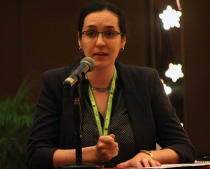Ulil defies Putrajaya ban, speaks to KL audience via Skype
Despite being denied entry into Malaysia, Indonesian Muslim scholar Dr Ulil Abshar Abdalla had the last laugh today as he addressed an audience of 100 in Kuala Lumpur today via Skype.
Ulil was speaking at the 3rd International Conference on Human Rights and Peace and Conflict in Southeast Asia, held at the Swiss Garden Hotel in the capital.
Other speakers at this morning's plenary session entitled "Religion and human rights in Southeast Asia" included Dr Melissa Crouch, currently a Research Fellow at the Centre for Asian Legal Studies, National University of Singapore and Dr Ahmad Farouk Musa, director of Islamic Renaissance Front (IRF).
Ulil had been scheduled to speak at a roundtable discussion organised by IRF in Damansara Heights on October 18.
However, the Malaysian Islamic Development Department (Jakim) said the discussion should be stopped because Ulil was well known for his liberal views.

The Immigration Department subsequently put Ulil on its blacklist and the latter was denied entry into Malaysia.
In his address, Ulil said the use of the term "kafir" (infidel) or "murtad" (apostate) to label Muslims of different views was a dangerous trend.
"Stopping the use of such terms is taking a big step towards eliminating or minimising religious violence,” he said.
"The use of such terminology creates an atmosphere of hatred and intolerance, and at the same time, discourages peaceful dialogues and discussions."
Ulil said Salafism, a puritan sect within Islam, had begun to take root in Indonesian society and was spreading fast.
One characteristic of Salafism, said Ulil, is to view Muslim followers of different schools as "kafir", "murtad" or deviant.
"For example, Ahmadiyyah (another sect of Islam) followers in Indonesia have been attacked by other Muslims, who see them as being different.
"The root of the problem is that religious conservatism appears to be increasing in Indonesia, which is leading to lack of understanding and tolerance."
Ulil said the Indonesian government appeared to be indecisive in handling issues of violence against minority religious groups.
"It is ironic that despite achieving democracy in 1998 and amending the constitution four times, reformasi Indonesia has also had drawbacks.
"Fanaticism and extremism appear to be on the rise and political parties have been taken hostage by these circumstances," Ulil said.
"The political parties are anxious to preserve their support among their followers, hence they cannot speak out on these issues for fear of alienating their supporters."

Meanwhile, Dr Farouk (pic, right) of IRF expressed concern at how Putrajaya was using Islam to deny Malaysians their rights as citizens.
"Islam as a religion has been used to silence non-Muslims from speaking out against injustices done to Muslims," Ahmad said.
"Putrajaya claims that non-Muslims should not speak about Islam as they were not qualified to comment.
"If religion plays a role in Malaysian politics, then everyone should be allowed to voice their opinion as government policy affects all Malaysians, not just Muslims," he said, pointing out that Malaysia was a multi-racial country.
Furthermore, Dr Farouk said the rights of Muslim minority groups in Malaysia such as Shia Muslims should be protected as Malaysia had endorsed the Amman Message in December 2005.
The Amman Message was initiated by King Abdullah II of Jordan in November 2004, and formalised by 200 leading Islamic scholars from 50 countries.
The formalisation took place at an international conference in Amman in July 2005, and endorsed by then prime minister Tun Abdullah Ahmad Badawi in December 2005.
The document embodies three essential points including recognising the validity of all 8 Islamic schools of thought such as Sunni, Shia and Ibadi Islam; of traditional Islamic theology or Ash'arism, Sufism, Salafism, forbidding of takfir (calling others apostate) between Muslims, and setting forth the subjective and objective preconditions for the issuing of fatwas, thereby exposing ignorant and illegitimate edicts in the name of Islam.
Dr Farouk said Putrajaya loved to double-speak or practise hypocrisy, and said right wing groups such as Isma and Perkasa were funded by the government.
"On the other hand, Malaysia wants to be one of the leaders of the Global Movement of Moderates, they want their cake and they want to eat it as well."
Dr Farouk noted that Malaysia was among a group of 16 countries, which includes Israel and Singapore, which had failed to ratify the International Convention on the Elimination of All Forms of Racial Discrimination (ICERD) adopted by the United Nations General Assembly in December 1965.
"Honestly, Malaysia's record in ratifying human rights treaties is embarrassingly dismal," he said, adding that Putrajaya needed to write a new moderate script for the country. – October 16, 2014.


